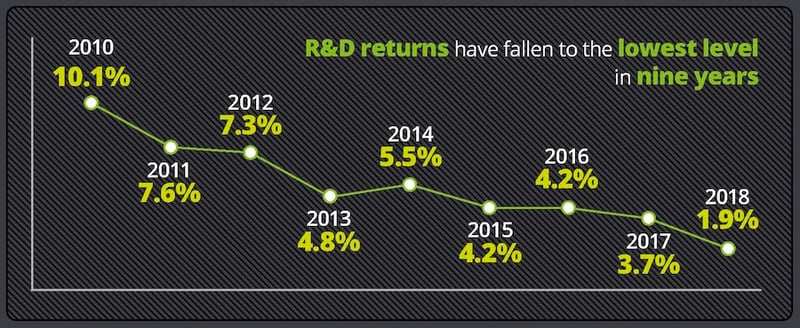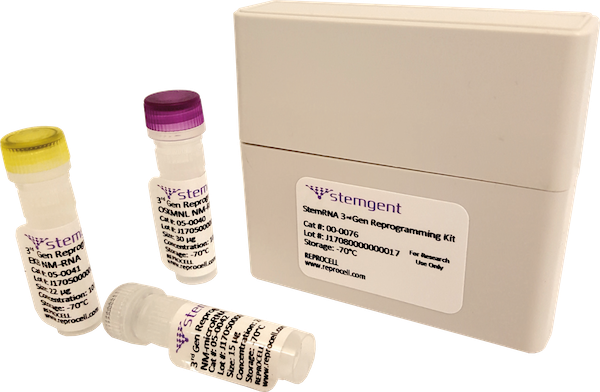How the Medical Discovery Catapult is Improving Precision Medicine
The return on R&D investments in the UK is at its lowest rate in nine years, despite Britain’s global presence in science, technology and health. Pharmaceutical attrition rates continue to rise, and the UK biotech landscape remains fragmented. Medicines Discovery Catapult (MDC) aims to connect the UK R&D community more effectively by putting the patient at the heart of the drug discovery process. As part of our collaboration with the MDC, REPROCELL have pledged to provide custom drug discovery assays using live human tissues.
The current R&D landscape in the UK
The UK life science sector has an estimated £60.7bn turnover [1]. However, its productivity is lower than the USA and drug attrition rates remain above 80% in some sectors [1,2]. The majority of novel therapies fail at clinical trial [2,3] and the return on R&D investments in the UK has fallen to the lowest level in nine years [4]. This is true despite the dramatic improvements in speed and throughput of drug screening thanks to technological advances.
If this trend continues, it is predicted that return on R&D investments with stand at 0% by 2020 [5]. Both academia and industry agree that a lack of relevant pre-clinical models represents a significant issue, yet researchers are limited by poor access to UK Biobanks. A further limitation is ineffective data sharing in the UK, which our pool of highly skilled Artificial Intelligence (AI) scientists depend on [6].

Figure 1: R&D Returns have fallen to the lowest rat e in nine years [4]
Improving Precision Medicine in Scotland
The MDC is a non-profit organisation that aims to tackle the key issues highlighted by UK R&D professionals. Their State of the Nation[7] report launched in January 2018 details the challenges currently faced by the UK’s drug discovery landscape according to interviews with over 100 company managers.
The primary aim of the MDC is to decrease the cost of novel drug development by connecting the UK R&D community through a shared vision: improvement of patient outcomes through the development of novel medicines. Partnership companies range from academic institutions, such as the Medical Research Council (MRC), to global pharmaceutical companies like AstraZeneca. Already, collaborations established by the MDC have matched five SMEs with relevant human tissues for their research [8] and have improved the efficiency of compound libraries through the application of AI [9]. The five strategic areas the MDC aims to fulfil are highlighted below [7].
- Catalyses "Disease Syndicates"
- Develop novel informatics platforms
- Develop and prove key technologies that humanise discovery
- Improve sample data access for all translational scientists
- Bulit a national virtual medicines R&D system
Human Tissue and Precision Medicine
As part of our collaboration with the MDC, REPROCELL have pledged to provide custom drug discovery assays using live human tissues. Improved access to human tissue and stem cell technologies will reduce late-stage failures, as human tissue models more accurately predict the safety and efficacy of drugs than their animal counterparts [10]. Elimination of unsuccessful compounds earlier in development would significantly reduce the cost of developing novel treatments and improve R&D productivity. By humanising drug discovery, the UK has the opportunity to differentiate itself from global competitors and enhance returns on R&D investment.
You can keep up to date with the MDC via their website, where you can download the full 2018 report.
References
- HM Goverment. Strength and Opportunity 2015: The landscape of the medical technology and biopharmaceutical sectors in the UK (2012)
- REPROCELL. REPROCELL join Medicines Discovery Catapult’s Virtual R&D network to accelerate drug development (2019)
- Thomas et al. Clinical Development Success Rates 2006-2015 (2015)
- Deloitte. Unlocking R&D productivity: Measuring the return from pharmaceutical innovation 2018 (2018)
- Scott. Pharma’s broken business model: An industry on the brink of terminal decline (2017)
- Medicines Discovery Catapult (MDC) & UK Bioindustry Association (BIA). State of the Discovery Nation and the role of the Medicines Discovery Catapult [report] (2018)
- Medicines Discovery Catapult (MDC). State of the Discovery Nation 2018 (2018)
- Medicines Discovery Catapult (MDC). Helping UK SMEs access tissue samples: a collaboration with Tissue Solutions (2019)
- Medicines Discovery Catapult (MDC). Harnessing the power of AI to focus compound collections: a collaboration with BioAscent (2019)
- Jackson et al. The Use of Human Tissue in Safety Assessment (2018)
Subscribe to receive updates from REPROCELL
Stem cell and drug discovery scientists around the world are using our services and products in their preclinical and clinical research.

